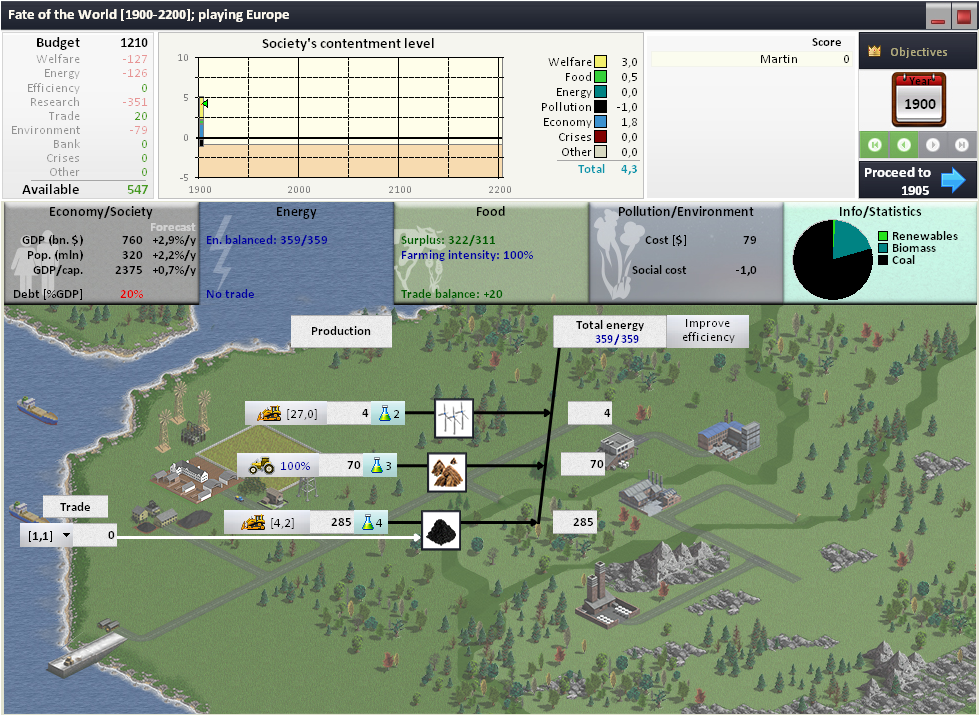
Polish chapter of ASPO, together with The Regional Environmental Center for Central and Eastern Europe have prepared a computer strategy game "World at the Crossroads". The game simulates the rise of the industrial civilization, from 1900 to 2200. You can look at it as a model of The Limits to Growth, commissioned by the Club of Rome in 1972, converted into a strategy game. The game helps understand systems dynamics and complex interactions between Earth and human civilization.
One can write hundreds of articles and books, but still it will be just passive transfer of knowledge. If one could only sit behind the control panel of our civilization and steer it through history… It would help understand why in the XX th century our history happened this way, it would let us look into the future and understand how our various decisions will influence it. Then, if something would go wrong, we could draw conclusions and try again. And once again, until everything is fine…
Do you know "Limits to growth"? Forty years ago scientists of the Club of Rome prepared a computer model, showing that our exponentially growing economy, based on nonrenewable resources, is on a collision course with reality, heading for a crash. They also showed, that our deliberate intervention in the system’s dynamics can prevent the disaster.
Here comes "World at the Crossroads" – a highly playable Windows computer game, prepared by the Polish ASPO chapter together with European Regional Environmental Center. The game simulates the rise of the industrial civilization, from 1900 to 2200. It can be viewed as a model of The Limits to Growth, commissioned by the Club of Rome in 1972, converted into a strategy game that helps understand systems dynamics and complex interactions between Earth and human civilization.

Energy panel AD 1900. World is simple. You have choice between primitive renewables, biomass and coal.
You can undertake decisions influencing your economy, society, agriculture, energy infrastructure and pollution controls. The aim is simple: make people happy. The better you meet their needs and avoid crises, the higher score you will have.
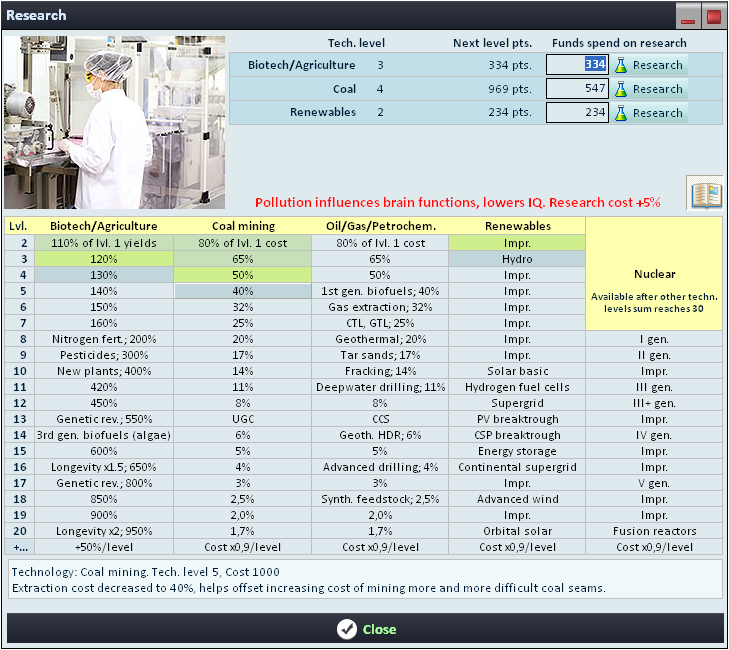
Better and cheaper technologies can help you grow a powerful economy. What energy technologies will you prioritize: fossil fuels extraction, renewable or nuclear? Every choice has its advantages and disadvantages.
The game realistically simulates key trends taking place during the growth of the industrial civilization. Demographic, economic data, energy use and extraction, food production and pollution are based on historical data. Models implemented in the game are also based on real data and dependencies. For example, game’s climate module is based on C-Roads model – algorithms and data are advanced enough that initialization of data for scenarios (GHG concentrations, carbon cycle, heat transfer in oceans, temperature growth, sea rise, ...) is performed just by tracking historic/forecasted GHG and sulphur aerosols emissions from 1750.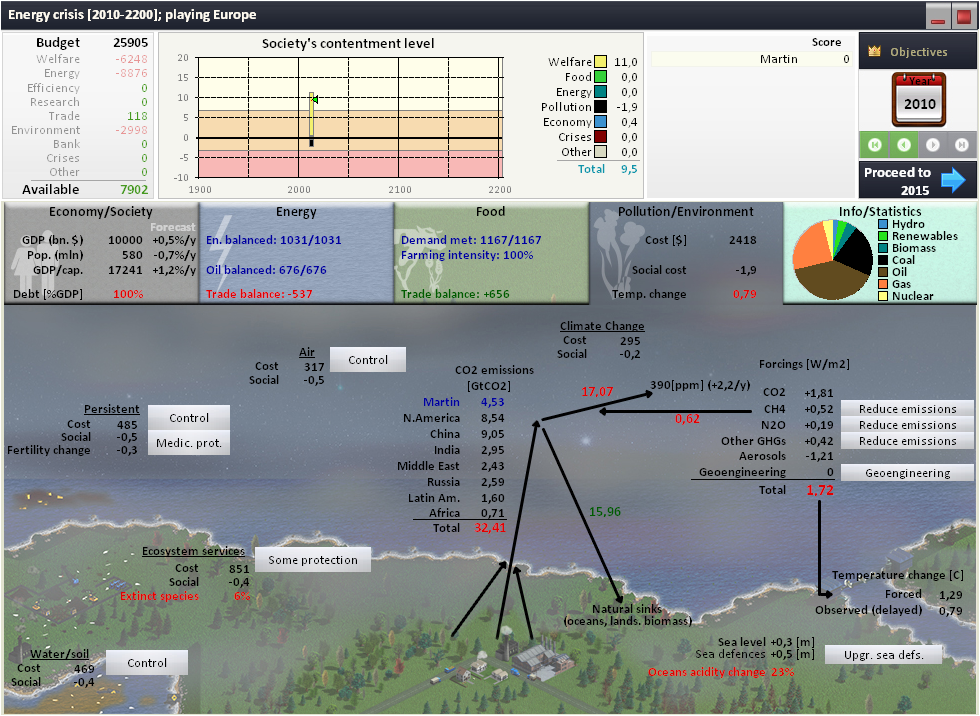
Pollution and climate change AD 2010. Can Europe influence the other major players enough to stop GHG emissions growth?
The game very realistically re-creates our choices and the history of our civilization in the XXth century, showing, that the strategy of exponential growth was a very logical choice and an efficient way to provide well-being to the people. Running the simulation further in time shows nevertheless, that sticking to this strategy for too long may lead to serious trouble, and if we want to preserve the achieved well-being and have a good and safe future, far reaching changes will be necessary. What’s more, the faster they take place, the easier the transition will be.
You can download the game here. Just download, unpack in a folder with writing rights and run WorldAtCrossroads.exe. Manual is available here.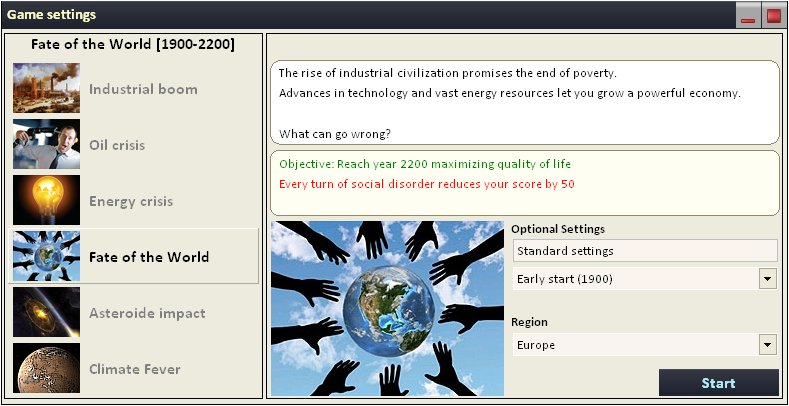
You have various scenarios to choose. What’s more, even the same scenario, played another region, may turn out to be a very different one.
You can start the game in 1900. Note that playing Europe or US is much different from playing Africa or India. You can also play today’s world, trying to pull it out of a series of incoming crises. You can try to build a world without fossil fuels. How about renewable or nuclear energy? You can check, how work breakneck growth and rapid technology development. You can also play a scenario, where you have to build a powerful economy, enabling you to destroy a huge asteroid being on a collision course with Earth – is it possible to maintain growth for centuries? Even if you hate all of humanity and other life on Earth and wish to exterminate it forever, You will find a scenario fitting your views. We invite you to play!
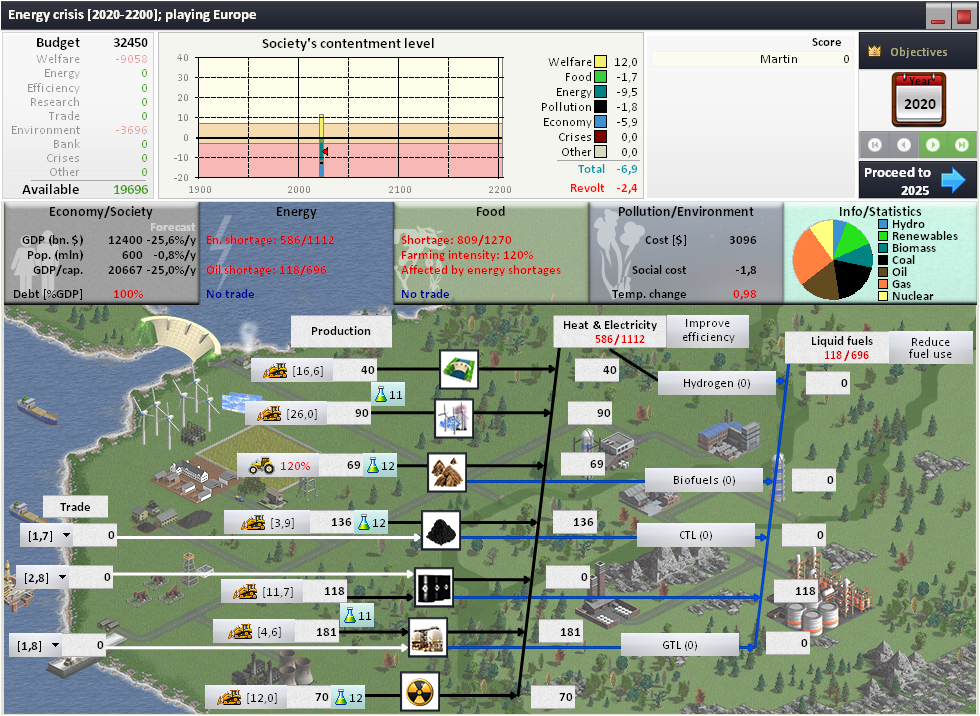
Energy panel AD 2020. World is a complex place. Can you take advantage of various options you have at your disposal?
Decisions have their consequences, though in many cases they manifest themselves years after. You will make decisions, face consequences and learn the connections. Playing the game you will notice that very often the most convenient in short-term decisions are a seed of a future trouble, and the actions aimed at a better future are costly and inconvenient in the short term. In the real world politicians prefer solutions that give quick payback – otherwise their chances for re-election would be dim. The ability to steer the country to the future, makes the difference between a politician and the statesman. Will you be a real one? Will you create a healthy economy, provide people with food and energy and limit adverse consequences of the climate change?
You are in charge of the civilization. Good luck!
We all know what to do,
we just don't know how to get re-elected after we've done it.
Jean-Claude Juncker on economic reforms
Posted by Marcin Popkiewicz on Monday, 11 November, 2013
 |
The Skeptical Science website by Skeptical Science is licensed under a Creative Commons Attribution 3.0 Unported License. |